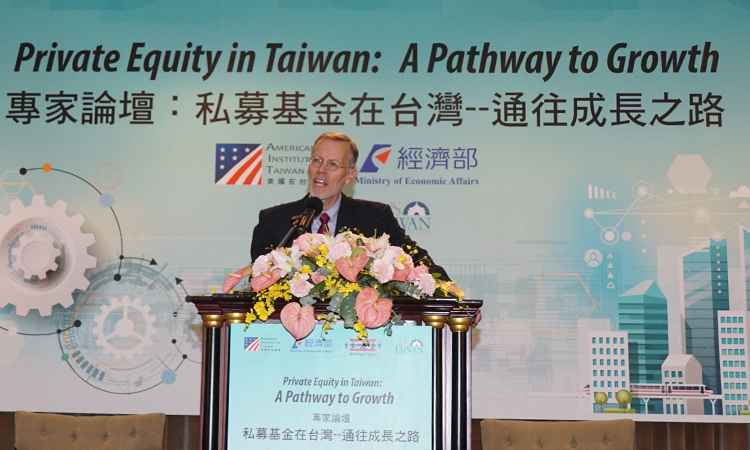Friday, September 14
AIT Official Text #: OT-1825
(As Prepared for Delivery)
Deputy Minister Kung, Deputy Minister Cheng, Vice Chairman Huang, ladies and gentlemen, good afternoon.
AIT is delighted to co-organize this Private Equity Forum with the Ministry of Economic Affairs. This event is part of an ongoing dialogue about the investment climate in Taiwan and part of the effort to raise awareness about the role of private equity in today’s economies. Minister without Portfolio John Deng, Bureau of Foreign Trade Director General Jenni Yang, and their hardworking teams have our sincere thanks for their support in putting this discussion together. I also want to express our appreciation to the American Chamber of Commerce in Taipei and the U.S.-Taiwan Business Council for helping to make it possible.
Although I only arrived last month to take up my duties as AIT Director, I am very familiar with the key issues in the U.S.-Taiwan economic relationship from my time as AIT’s Deputy Director, and previously as Director in the State Department’s Office of Taiwan Coordination. Investment has long been an issue that has commanded our shared attention.
It is easy to understand why: It is because the United States and Taiwan investment relationship is highly – and mutually – beneficial. The United States is the number-one single-source FDI investor in Taiwan. As of 2017, our FDI stock in Taiwan stood at $17 billion, while Taiwan’s FDI stock in the United States reached $8 billion, according to U.S. data. This two-way investment leverages each market’s advantages, while fostering close, productive cooperation between our manufacturers, our innovators, and our service providers.
The United States, for our part, very much welcomes foreign investment, including and especially from Taiwan. Taiwan investors appreciate the relative ease of doing business in the United States, our skilled workforce, our highly developed business law, our predictable business climate, our favorable tax rates, our affordable energy supply, and our location close to their customers. As a mark of Taiwan’s enthusiasm, Taiwan sent the largest delegation from anywhere in the world to the SelectUSA investment summit held in June in Washington, D.C. Taiwan, for its part, offers its foreign investors tightly-integrated, technologically sophisticated commercial ecosystems; a free, open, and stable democratic system based on the rule of law; strong intellectual property rights protections; adherence to international norms and practices; and a highly talented workforce.
Underpinning this investment relationship is our shared commitment to free and open markets, as well as to the free flow of capital, and an openness to new initiatives. This commitment is the foundation that helps us realize the full potential of our businesses’ investment dollars.
As context for today’s discussion, I ask all of our friends gathered here to remember that the global investment landscape looked very different not too long ago. In the last century, developing economies primarily sought capital from industrialized economies for greenfield investment. In the pre-Internet era, there was less transparency, due diligence was more difficult, and information about investment opportunities was harder to come by. How times have changed!
Today, FDI has evolved to include financial investment by companies of all sizes. Capital can now be sourced from practically anywhere. Investment opportunities can be uncovered in all sectors of an economy. Someone with a good idea in a small market or developing country can identify and work with partners from around the world to help take their vision to the next level. Investors are no longer simply building factories from scratch; they are looking for opportunities to help upgrade businesses in technology, healthcare, financial services, communications, and nearly every other sector you can think of.
Taiwan, of course, is renowned for its many successful innovators and dynamic companies, whose technologies have helped propel the world’s economic progress. We often hear from Taiwan firms that they hope to find opportunities to team up with partners who have the resources, managerial experience, and financial expertise to help them flourish. Private equity provides precisely that kind of opportunity, with tailored solutions to help companies grow to the next stage of development. Many of Taiwan’s most successful companies – its hidden champions – were founded in the 70s and 80s. Private equity investment provides a means to ensure these companies continue to thrive long after their original founders retire. Private equity also offers the tantalizing prospect of helping firms expand far beyond Taiwan’s shores into the international market.
I truly believe that Taiwan can spark more innovation by enabling more kinds of investment in the local market. Private equity, just like venture capital and other types of investment, should be regarded as a standard part of the investment mix in Taiwan, as it is in every other major economy.
As you will hear in today’s discussions, private equity investment has proven to be one of the main drivers in promoting greater regional and global economic integration. Nearby Asian countries have learned to utilize private equity to upgrade industrial structures and add value both to acquired businesses and to the economy as a whole.
The foreign investor community has taken notice of Taiwan’s renewed efforts to attract more foreign investment. Many U.S. and other private equity investors have strong confidence in the great growth potential of Taiwan companies. Taiwan’s domestic private equity sector is also growing to help facilitate this goal.
With so much room to grow in private equity, I hope that Taiwan will fully realize the benefits that it can bring and create new pathways to growth.
Thank you, and I hope you enjoy and learn from today’s discussion.
















![Video Thumbnail [Recovered]-01](../wp-content/uploads/sites/269/Video-Thumbnail-Recovered-01-1-750x450.jpg)




